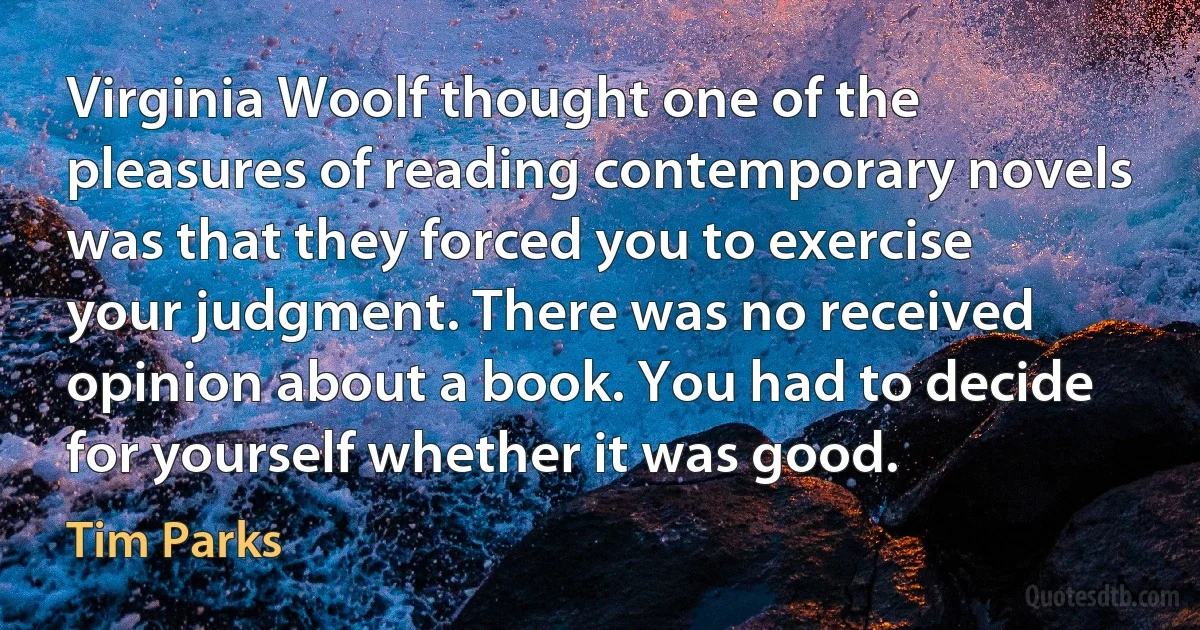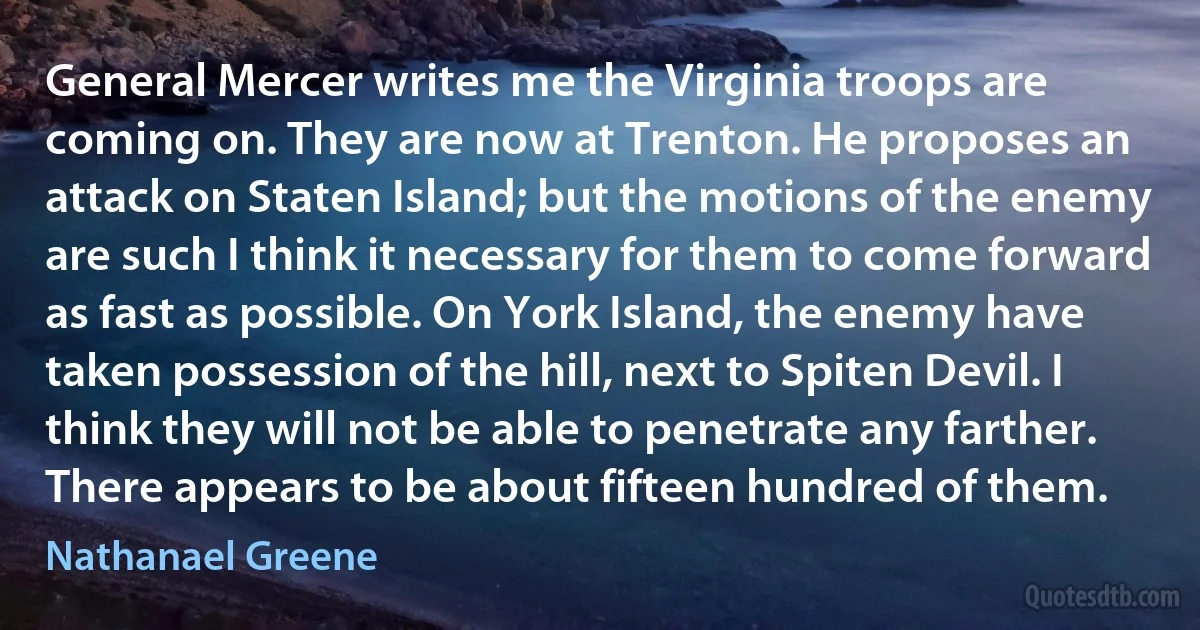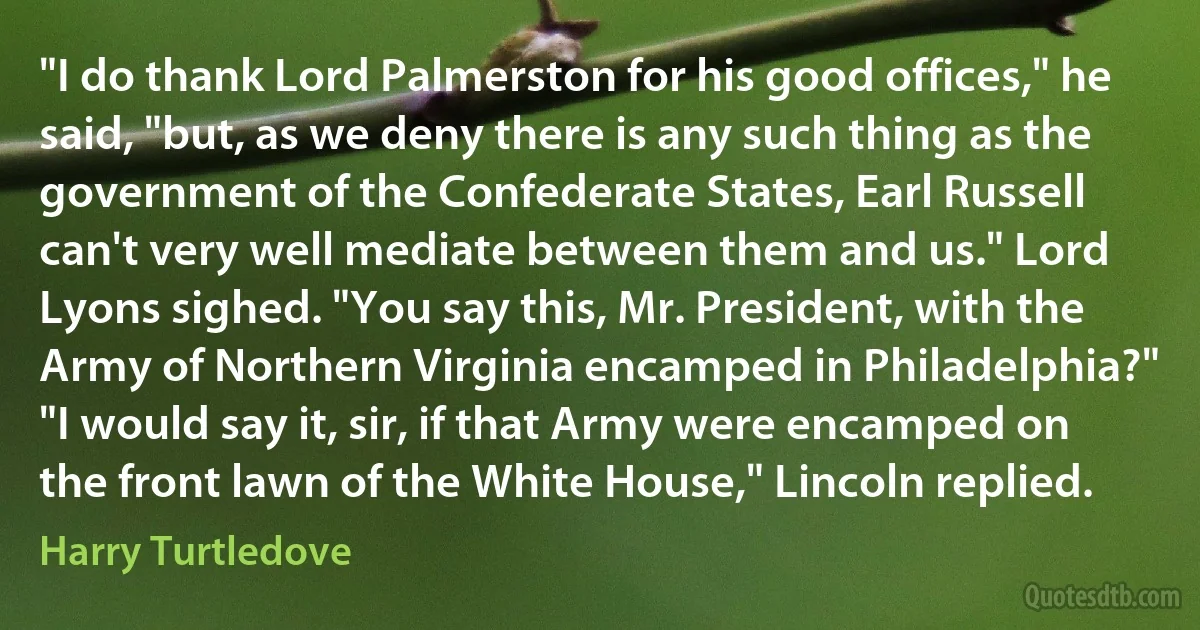Virginia Quotes - page 4
My wife and child and I were on a camping trip and we stopped in Virginia City. In the Opera House, I saw a photograph of Maude Adams, the famous American actress. It was such a great photograph that creatively I fell in love with her. What if some guy did the same thing and could go back in time?

Richard Matheson
But she [Virginia Woolf] is impotently distant from an understanding of the proper relations between literature and society, because she has no clear sense of the functions of literature. She sees writers as individual 'artists' working in mysterious privacy - which from time to time society rudely invades. Her writer, indeed, has all the characteristics of traditional 'femininity' - with society as the big strong male who should protect and cherish his literary womenfolk, but does not. She might - for all the application of her complaint to the relations between society and literature - be talking of the relations between husbands and wives.

Laura Riding
Only a few industrious Scots perhaps, who indeed are dispersed over the face of the whole earth. But as for them, there are no greater friends to Englishmen and England, when they are out on 't, in the world, than they are. And for my own part, I would a hundred thousand of them were there [Virginia]; for we are all one countrymen now, ye know, and we should find ten times more comfort of them there than we do here.

George Chapman
April 7, 1865. General R. E. Lee, the result of the last week must convince you of the hopelessness of further resistance on the part of the Army of Northern Virginia in this struggle. I feel that it is so, and regard it as my duty to shift from myself the responsibility of any further effusion of blood, by asking of you the surrender of that portion of the C. S. Army known as the Army of Northern Virginia. U. S. Grant, Lieutenant-General.

Ulysses S. Grant
We lost 2 great friends and patriots today. Berke and Jay will be greatly missed. TY for your service to VA.
We are deeply saddened by the loss of Jay and Berke, both of whom were our close friends and trusted members of our team. Jay has flown us across the commonwealth for more than three and a half years. Berke was devoted to our entire family as part of our Executive Protective Unit team for the past three years.
This is a devastating loss for their families, the Virginia State Police, and the entire commonwealth. Out hearts go out to their wives and children, and we stand by to support them during this difficult time. These heroes were a part of our family and we are simply heartbroken.

Terry McAuliffe
While North Carolina has the honor of first authorizing its delegates to concur with other Colonies in declaring independence, it was quickly followed by South Carolina and Georgia, which also gave general instructions broad enough to include such action. But the first instructions which unconditionally directed its delegates to declare for independence came from the great Commonwealth of Virginia. These were immediately followed by Rhode Island and Massachusetts, while the other Colonies, with the exception of New York, soon adopted a like course.

Calvin Coolidge
The foreboding statesman who knew how Greece had fallen asunder and perished, who knew the mean tenure of European leagues, who knew the absolute necessity of union and the jarring jealousies of sections, saw in the Constitution but a shadowy bond which foretold early separation and disaster. It was not strange when the Union was scarcely ten years old, still in the gristle, he heard the serpent of State sovereignty angrily hissing in the Virginia and Kentucky resolutions of '98.

George William Curtis
Here I come to one of the memoir writer's difficulties - one of the reasons why, though I read so many, so many are failures. They leave out the person to whom things happened. The reason is that it is so difficult to describe any human being. So they say: ‘This is what happened'; but they do not say what the person was like to whom it happened. Who was I then? Adeline Virginia Stephen, the second daughter of Leslie and Julia Prinsep Stephen, born on 25th January 1882, descended from a great many people, some famous, others obscure; born into a large connection, born not of rich parents, but of well-to-do parents, born into a very communicative, literate, letter writing, visiting, articulate, late nineteenth century world.

Virginia Woolf
In like manner the Reverend Dr. William A. Smith, President of the Randolph-Macon College in Virginia, in his work upon the Philosophy and Practice of Slavery, deliberately repudiates Mr. Jefferson's view of slavery as a 'grossly offensive error', and attributes the anti-slavery movement to him – which is as wise as to attribute the motion of the earth to Galileo. Judge Wayne, in his late charge at Savannah upon the law against the slave-trade, confirms Mr. Stephens's statement. And, as if to establish it by the most unexpected testimony, Mr. Edward Everett, in his late discourse upon Daniel Webster, said, 'In common with all, or nearly all, the statesmen of the last generation, he believed that free labor would ultimately prevail throughout the continent'.

George William Curtis
Carolina or Virginia may try to break away. In the effort it may destroy its local government as it has now destroyed it, except by successful revolution no rebellious state can escape the jurisdiction, and it will be reorganized exclusively by the national authority of the United States of America. This is what Gettysburg roars and Vicksburg and Port Royal. This is the thunder of the Kearsarge as she sinks the Alabama, This is the song of Sherman's march to the sea; and Lee's surrender, the fall of Richmond, and the universal crash of the rebellion mutter and murmur their reluctant 'Amen, Amen'. But, at the same moment that the profound sense of nationality and the power of the nation are revealed, the national mind has gained a clear perception of the relation of morals and politics, the strict dependence of civil order and national prosperity upon morality.

George William Curtis
Keeping the Army of Northern Virginia fed and clothed was a never-ending struggle. His men were making their own shoes now, when they could get the leather, which as not often. The ration was down to three-quarters of a pound of meat a day, along with a little salt, sugar, coffee- or rather, chicory and burnt grain- and lard. Bread, rice, corn... they trickled up the Virginia Central and Orange and Alexandria Railroad every so often, but not nearly often enough. He would have to cut the daily allowance again, if more did not arrive soon. President Davis, however, was as aware of all that as Lee could make him. To hash it over once more would only seem like carping.

Harry Turtledove
"It is an evil, sir, an unmitigated evil," Lincoln said. "I shall never forget the group of chained Negroes I saw going down the river to be sold close to a quarter of a century ago. Never was there so much misery, all in one place. If your secession triumphs, the South will be a pariah among nations." "We shall be recognized as what we are, a nation among nations," Lee returned. "And, let me repeat, my being here is a sign secession has triumphed. What I would seek to do now, subject to the ratification of my superiors, is suggest terms to halt the war between the United States and Confederate States." Lincoln refused to call Lee's country by its proper name. As a small measure of revenge, Lee put extra weight on that name. Lincoln sighed. This was the moment he had tried to evade, but there was no evading it, not with the commander of the Army of Northern Virginia in his parlor. "Name your terms, General," he said in a voice full of ashes.

Harry Turtledove
Robert E. Lee paused to dip his pen once more in the inkwell. Despite flannel shirt, uniform coat, and heavy winter boots, he shivered a little. The headquarters tent was cold. The winter had been harsh, and showed no signs of growing any milder. New England weather, he thought, and wondered why God had chosen to visit it upon his Virginia.

Harry Turtledove



